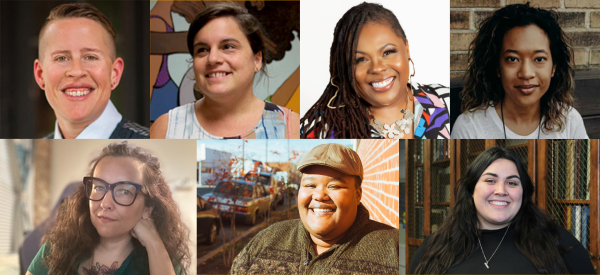In partnership with VCU Libraries, a faculty team in the Gender, Sexuality, and Women’s Studies Department (GSWS) has received $10,000 from the Southern Regional Education Board’s Open Educational Capacity Building Grant program.
The funded project will create a new open textbook for GSWS 201: Introduction to Gender, Sexuality and Women’s Studies in just one year–a fast pace in academic publishing. As part of this accelerated model, the team will participate in four full-day writing and review retreats held across the fall and spring semesters, designed to support intensive collaboration, peer feedback and steady progress toward publication.
The project team is: GSWS faculty Eli Coston, associate professor and the associate chair; Liz Canfield, professor; Dawn Johnson, Paulina Guerrero and Francesca Lyn, assistant professors; along with adjunct Brooke Taylor and Abbey Childs, open educational resources librarian with VCU Libraries.
The grant program supports postsecondary institutions in the South to implement open initiatives that build institutional capacity, integrate open materials into core curricula and develop models that can be replicated on other campuses. This award is funded through the support of the William and Flora Hewlett Foundation, administered by the Southern Regional Education Board.
Faculty within the GSWS Department have long demonstrated a commitment to open education work. Most courses in the department use free open materials or library resources or low-cost resources to supplement open materials. In 2018, the department created an open textbook for GSWS 201: Introduction to Gender, Sexuality, and Women’s Studies, funded by the VCU Libraries Affordable Course Content Awards program. That free text serves 1,000 students every year, with an estimated cost savings to students of $100,000 per year.
Even with its ongoing positive impact on students, the current GSWS 201 textbook is due for an update. It doesn’t reflect significant changes in the field since its publication in 2018, including impacts from the COVID-19 pandemic and advancements in reproductive justice or LGBTQIA+ studies. Other existing OER textbooks in this discipline provide a distinctly social science perspective, while the department takes an interdisciplinary and humanities-informed approach, requiring inclusion of material from fields such as visual and performance arts and media studies. This project will undertake the work of restructuring the course and creating a custom textbook that will be comprehensive, up to date, and address student learning objectives.
“Our team is thrilled to develop this resource for our students,” says Eli Coston, Ph.D. “With this text, we will ensure that all of our students leave Introduction to Gender, Sexuality, and Women’s Studies with a firm foundation to understanding the field. Additionally, our text will emphasize the transdisciplinary nature of our department and provide a balance of social science, humanities and arts perspectives.”
One of the perennial challenges of open education work is the gap between faculty capacity and the time required to create and update course materials. This project will build on the library’s existing publishing support infrastructure to pilot a rapid publishing model. The grant funding to pilot this model will support a larger project team that is working on a shorter timeline than is typical for academic projects.
In addition, Open Educational Resources Librarian Abbey Childs will provide hands-on support throughout the year to ensure a successful implementation. She will provide professional development for faculty authors on topics such as copyright, open licensing and accessibility. Childs will also facilitate full-day writing retreats throughout the year to ensure the project team has time and space to workshop content in a collaborative environment. Lastly, the grant funding allows the recruitment and compensation of external reviewers, which contributes to creating a quality product. Materials created in piloting this model, including slide decks for professional development and facilitation guides for the writing retreats, will be openly licensed and shared to allow for replication at other institutions.
“I couldn’t be more excited to pilot the rapid publishing model,” says Childs, “The library offers fantastic support for open materials through our Affordable Course Content Awards, but creating is time- and labor-intensive and those projects tend to span several years. Having the additional grant support to bring together a larger project team and to host the writing retreats will move this project through the authoring and production processes quickly and into the hands of our students.”
The VCU Libraries Open and Affordable Course Content initiative is one of the central drivers on campus in support of open education. The VCU Libraries initiative has supported more than $12 million in textbook cost avoidance and impacted more than 135,000 students since its inception in 2017.
This article was originally published by VCU Libraries.
